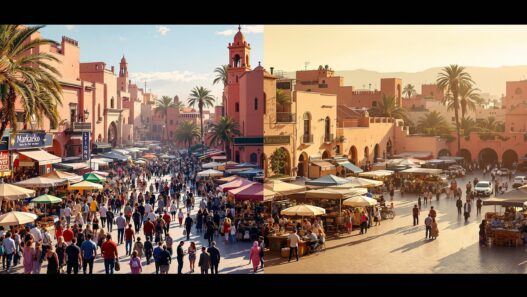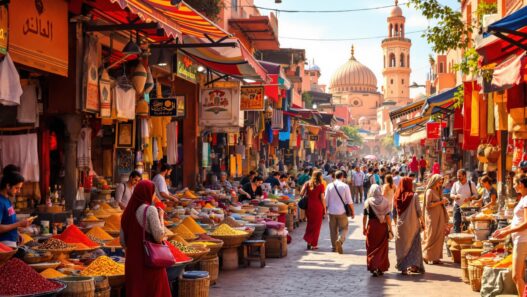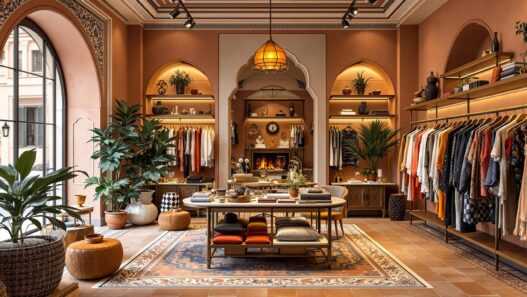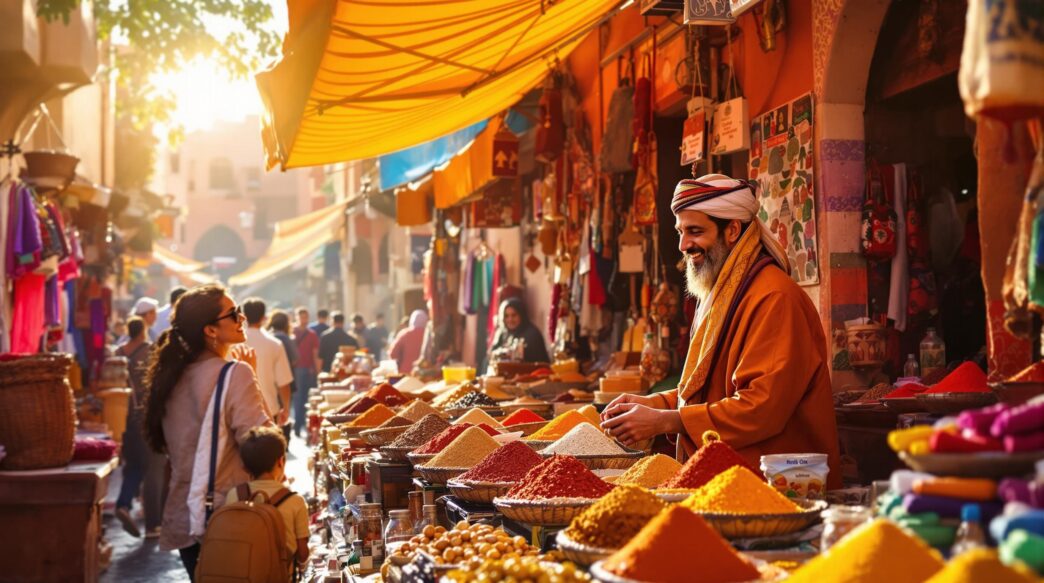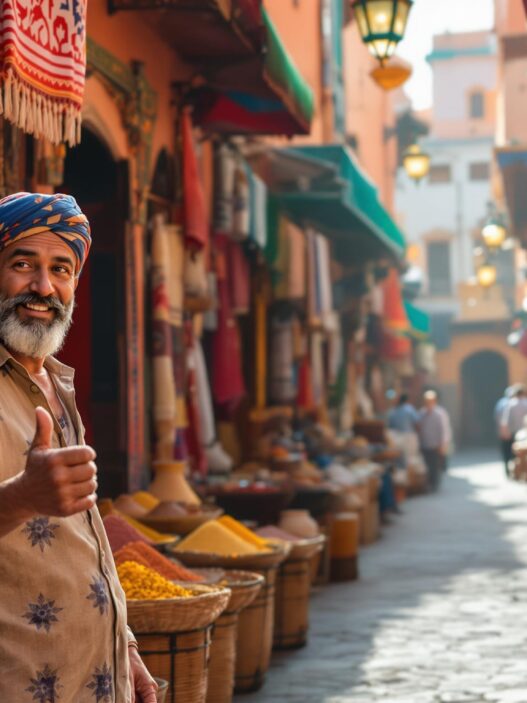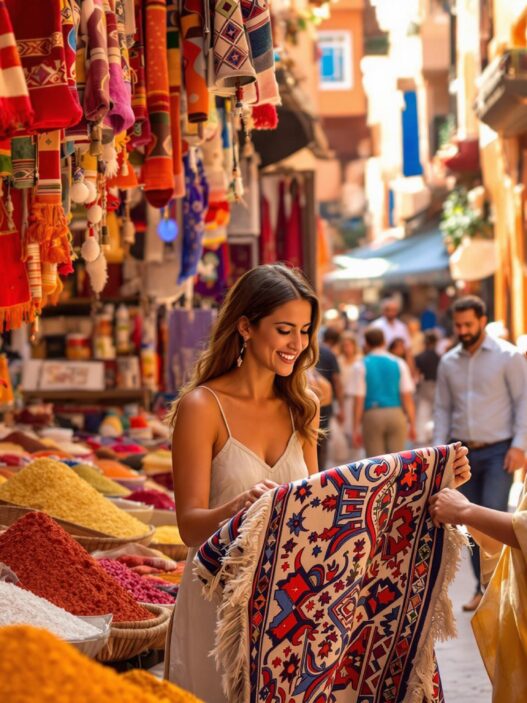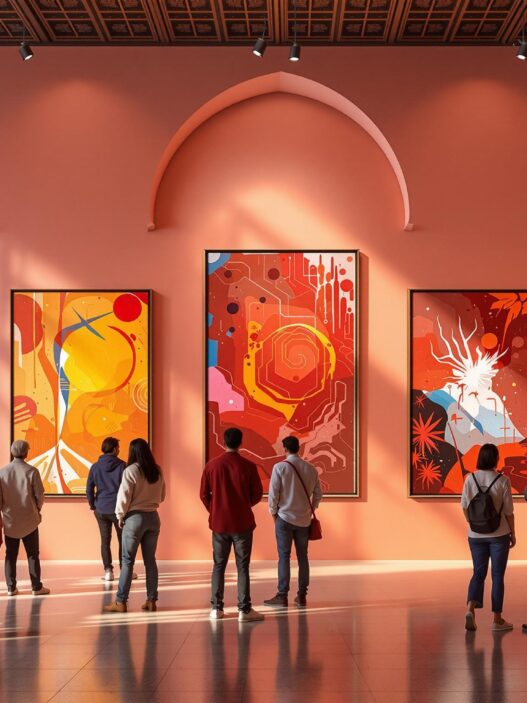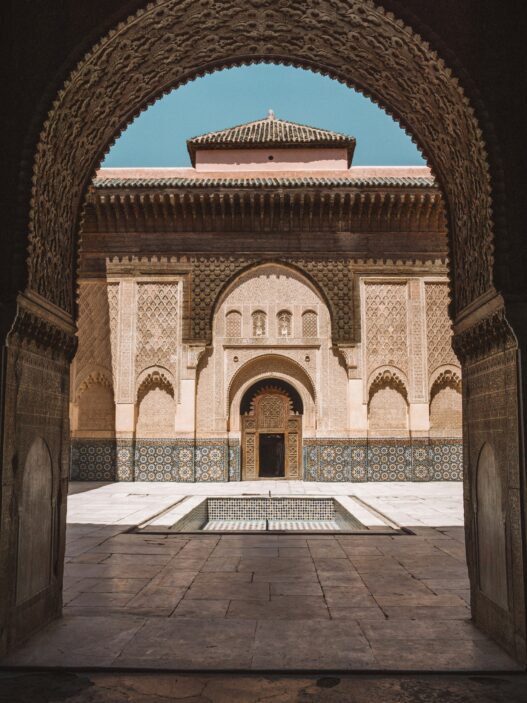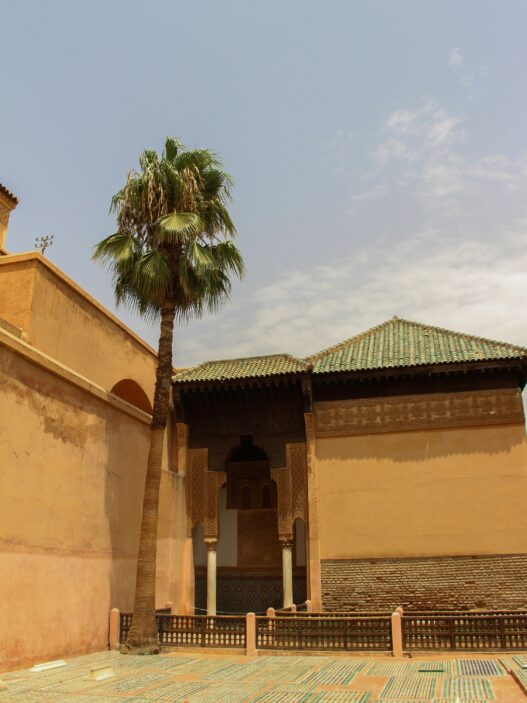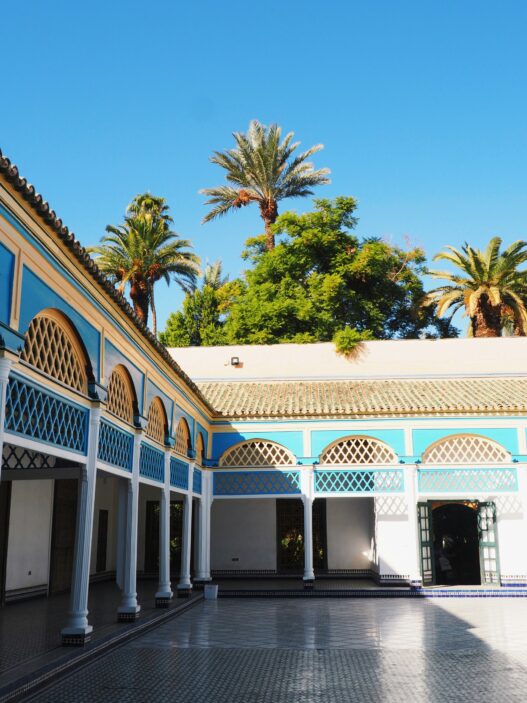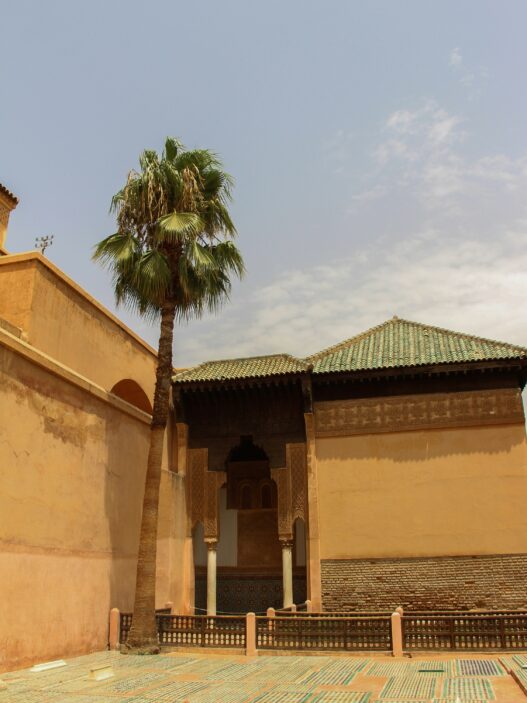Traveling to Marrakesh? Respecting local customs is key to a smooth and meaningful visit. Here’s what you need to know:
- Dress modestly: Cover shoulders and knees; women should carry a scarf for religious sites.
- Mind public behavior: Avoid public displays of affection and use your right hand for gestures or eating.
- Dining etiquette: Wait for the host to start the meal, eat with your right hand, and tip at least 10%.
- Ramadan rules: Avoid eating, drinking, or smoking in public during daylight hours.
- Religious sites: Dress appropriately, remove shoes, and behave respectfully.
Learning basic Arabic phrases like "As-salamu alaykum" (Peace be upon you) and practicing polite bargaining in markets can help you connect with locals. Follow these tips to navigate Marrakesh respectfully and enjoy its vibrant culture.
Marrakesh’s Cultural Background
Moroccan Culture Overview
Marrakesh is a city where Berber, Arab, and French influences come together, creating a rich cultural tapestry. Since its founding in the 11th century as a key trade center, these influences have shaped its identity. Understanding this blend can help visitors respect local customs and traditions.
Islam is deeply woven into daily life and social interactions in Marrakesh. Events like the Marrakech International Film Festival and Marrakech Popular Arts Festival showcase how the city balances its rich traditions with a modern touch [1].
Social norms are also influenced by the concept of "hshuma" (shame), which emphasizes modesty and respect in both public and family life [2] [4].
Important Cultural Considerations
Marrakesh’s conservative society calls for mindfulness, especially regarding daily customs and traditions. For instance, the call to prayer rings out five times a day, marking key moments in the city’s rhythm [4].
"In Morocco, it is very important to respect people. This is also something you see while waiting in line for customs; the guys dividing the queues and making sure everything runs smoothly, they are very keen on helping older people, disabled people and people with children." [2]
If visiting during Ramadan, avoid eating or drinking in public during daylight hours, stay quiet during prayer times, and be mindful of the increased importance placed on prayer and family connections.
Marrakesh’s streets and spaces reflect its cultural depth. From traditional souks where bargaining is an art to modern neighborhoods shaped by French colonial architecture, every corner tells a story [1] [4]. Understanding these layers will make navigating the city smoother and more respectful.
What Not To Do When Visiting Morocco – Cultural Do’s and Don’ts
Public Behavior and Social Manners
Knowing how to behave in public is important when visiting Marrakesh. It helps you connect with people while respecting their customs. Here are some key points to keep in mind for navigating social situations.
Dress Modestly
In Marrakesh, modest clothing is important, especially at religious sites or in rural areas. Both men and women should cover their shoulders and knees [1] [2]. This simple gesture helps you blend in and shows respect for local norms.
Women might want to carry a scarf to cover their hair when visiting religious places. In more conservative areas, wearing longer sleeves and loose-fitting clothes can make everyone feel more at ease.
Keep Personal Affection Private
Public displays of affection, like kissing, hugging, or prolonged hand-holding, are seen as inappropriate and might make locals uncomfortable [5].
A handshake is usually fine when greeting someone of the same gender. Over time, as you get to know someone better, the traditional greeting of kissing both cheeks might become acceptable [4].
Be Polite in Interactions
Politeness goes a long way in Marrakesh, and understanding local customs can make your interactions smoother. Here are some key tips:
| Interaction Type | Proper Behavior | Importance |
|---|---|---|
| Greetings | Use "As-salamu alaykum" or formal titles like Mr./Mrs. | Shows respect and cultural understanding |
| Hand Usage | Always use your right hand for gestures or exchanges | The left hand is considered impolite for such actions |
| Eye Contact | Avoid prolonged eye contact with the opposite gender | Helps maintain cultural boundaries |
When in public spaces, pay special attention to elders, people with disabilities, and families with children [2].
Learning these social manners can help you navigate Marrakesh respectfully and enjoy meaningful interactions with its people.
Dining Manners in Marrakesh
Dining in Marrakesh is more than just eating – it’s about embracing hospitality and enjoying shared moments. Knowing the local customs can help you connect with the people and show your respect for their traditions.
Eating with Your Right Hand
In Marrakesh, eating with your right hand is a key part of the culture. Always use your right hand to handle food, and do so gently. The left hand is traditionally considered unclean and should rest in your lap during the meal [3][7]. Avoid using your entire hand or the left hand, as this can be seen as impolite.
Dining Etiquette
Traditional Moroccan meals come with their own set of rules to honor both the food and your hosts. Before you start eating, wait for the host to say "Bismillah" (in the name of Allah) [3]. If you’re eating from a communal dish, take food only from the area directly in front of you.
Bread plays an important role in the meal. Wait for it to be passed to you, and use it to scoop sauces or clean your fingers instead of licking them [3]. Handwashing is also a key part of the experience – use the provided basin to wash your hands before and after the meal [4].
Tipping Customs
When it comes to tipping, leaving 10% is the norm. However, avoid leaving just one dirham, as this can be seen as disrespectful. Always leave at least 2 dirhams [3]. In restaurants, waiters may not check on you often after taking your order. If you need something, simply signal to get their attention.
sbb-itb-fa26f1f
Understanding Social Norms and Traditions
Marrakesh’s dining customs showcase its warm hospitality, but its broader social and religious traditions highlight the city’s deeply ingrained values. Being aware of these practices not only shows respect but also fosters meaningful connections with locals.
Ramadan Etiquette
During Ramadan, refrain from eating, drinking, or smoking in public between sunrise and sunset. Keep meals private, minimize noise during prayer times, and greet locals with "Ramadan Mubarak" as a gesture of respect. It’s also wise to plan major activities after fasting hours [4].
Visiting Religious Sites
When exploring religious sites, dressing modestly is a must. Women should also carry a headscarf for added respect. While Marrakesh’s Koutoubia Mosque is not accessible to non-Muslims, it stands as a symbol of the city’s deep reverence for sacred spaces [4].
| Requirement | Details |
|---|---|
| Dress Code | Cover shoulders and knees; women should bring a headscarf |
| Footwear | Remove shoes before entering prayer areas |
| Photography | Avoid taking photos inside prayer spaces |
| Behavior | Speak softly, stay respectful, and avoid pointing with feet or touching artifacts |
When visiting these sites, maintain a quiet demeanor and avoid handling religious artifacts or decorations. Moroccans are known for their hospitality, but they hold their religious traditions in high regard. Respecting these customs not only enhances your visit but also helps preserve the sanctity of these spaces [5].
Practical Advice for Visitors
Exploring Marrakesh means understanding its customs and traditions. Here’s some practical advice to help you connect with locals and enjoy the city respectfully.
Learn Basic Phrases
Knowing a few Arabic phrases can make a big difference. Here are some helpful ones:
| Phrase | Meaning | Usage |
|---|---|---|
| As-salamu alaykum | Peace be upon you | Standard greeting |
| Wa alaykum as-salam | And peace be upon you too | Response to greeting |
| Shukran | Thank you | Expressing gratitude |
| Min fadlak/Min fadlik | Please | Making polite requests |
Even small efforts to speak Arabic are warmly received by locals [6].
Bargaining in Markets
Haggling is a part of shopping in Marrakesh’s markets, but it’s all about respect and friendliness.
"Bargaining should be approached with a friendly and respectful attitude, engaging in some back-and-forth before reaching a final price. It’s customary to negotiate prices in souks, but it should be done in a polite manner" [7].
Here’s how to approach it:
- Show genuine interest in the items you’re considering.
- Keep the tone light and friendly throughout the discussion.
- Start by offering around 40% of the initial asking price.
- If you can’t agree on a price, walk away politely – it’s part of the process.
Using The Marrakesher
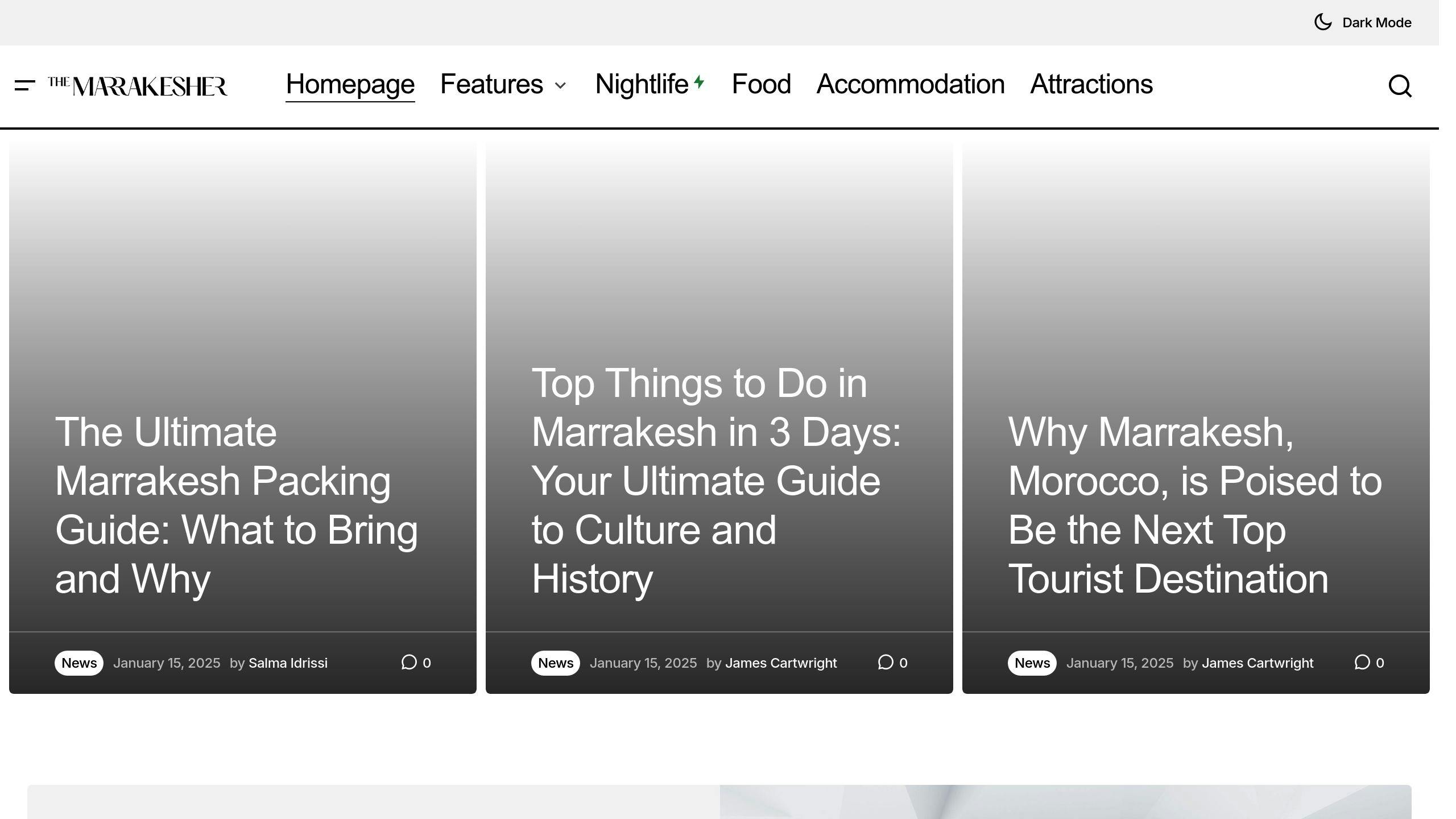
For English-speaking visitors, The Marrakesher blog is a fantastic resource. It offers detailed guides on local customs, dining etiquette, and tips for navigating markets. You’ll find:
- Insights into cultural norms and expectations.
- Recommendations for restaurants and proper dining practices.
- Step-by-step advice on bargaining and exploring the souks.
It’s a great tool for anyone looking to better understand and enjoy Marrakesh.
Conclusion: Practicing Respectful Travel
Now that you’ve learned about Marrakesh’s customs and traditions, here are ways to incorporate them into your visit for a more meaningful experience.
Respecting Marrakesh’s heritage involves understanding its traditions and showing consideration for local values. Simple gestures like dressing modestly (covering shoulders and knees), removing your shoes when appropriate, and maintaining a respectful demeanor at religious sites can go a long way [1] [2].
Being mindful in your interactions with locals can make your trip more enriching. Here’s a quick guide to key practices for respectful travel in Marrakesh:
| Aspect | Practice | Impact |
|---|---|---|
| Dining | Follow traditional customs | Honors shared meals and local hospitality |
| Public Behavior | Respect social norms | Reflects cultural awareness |
| Social Interaction | Engage in meaningful exchanges | Builds genuine connections |
| Religious Observance | Show respect for traditions | Demonstrates thoughtfulness and understanding |
Cultural respect is more than just following guidelines – it’s about creating genuine connections. By adopting these practices, you help promote tourism that benefits both visitors and the local community [1] [2] [4].
Your efforts to understand and respect Marrakesh’s customs won’t go unnoticed. This mutual respect fosters opportunities for meaningful cultural exchanges and lasting connections with the people of Marrakesh.
FAQs
Can you show PDA in Morocco?
Public displays of affection (PDA) are not part of the cultural norm in Morocco, including Marrakesh. While such gestures might be typical in some Western countries, they are considered inappropriate in Moroccan society, which values modesty and respect in public interactions.
Here’s a quick guide to physical interactions in Marrakesh:
| Type of Interaction | Cultural Acceptability | Cultural Context |
|---|---|---|
| Cross-Gender PDA/Contact | Avoid | Goes against local customs and traditions |
| Same-Gender Hand Holding (Men) | Common & Acceptable | Seen as a friendly gesture, not romantic |
| Greetings Between Men | Acceptable | Handshakes or cheek kisses are customary |
When interacting socially, focus on verbal communication and maintaining respectful boundaries, particularly with the opposite gender. For greetings, observe the locals: men often shake hands or exchange cheek kisses, while interactions with women tend to remain more formal.





